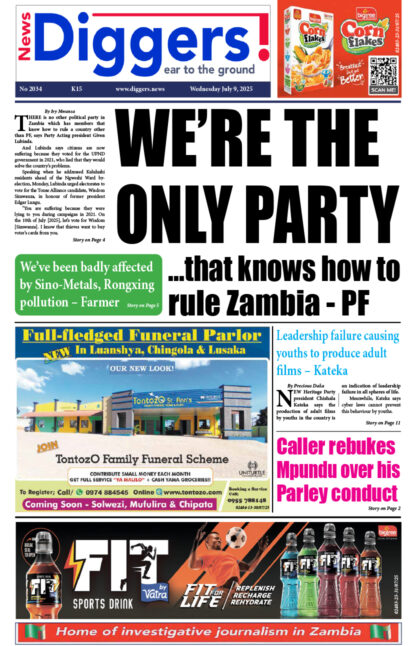News Diggers! is not a Yes Bwana (Yes Sir) newspaper, says British High Commissioner to Zambia Fergus Cochrane-Dyet.
And Information Minister Dora Siliya has announced that government is reaching out to stakeholders to formulate a Bill which will establish the Media Association of Zambia, through which media practitioners shall regulate themselves.
Meanwhile, News Diggers! Board Chairman Dr Sangwani Ng’ambi has appealed to the Information Minister to honour her commitment of tabling the Access to Information Bill during this current sitting of Parliament.
The trio was speaking during the official launch of the News Diggers! one-week media training programme on Investigative Journalism and Fact Checking, Tuesday.
Other speakers were US Ambassador to Zambia Daniel Foote, represented by Embassy public affairs director Sean Mclntosh and United Nations Country Coordinator Janet Rogan, represented by Information Officer Mark Maseko.
In his remarks, High Commissioner Cochrane-Dyet congratulated News Diggers! for increasing the openness and diversity of news provision in Zambia.
“I read News Diggers! daily and wish to congratulate you for increasing the openness and diversity of news provision in Zambia. In June, in response to my comments about corruption, you ran an editorial about me entitled “Fergus is not a Yes Bwana diplomat”. In my view this is a worthy epitaph, and I should like to return the favour by stating that “News Diggers is not a yes bwana newspaper”!” High Commissioner Cochrane-Dyet said.
High Commissioner Cochrane-Dyet observed that media freedom was under threat globally, noting that 2018 was one of the deadliest years for journalists.
“Indeed 2018 was one of the deadliest years for journalists: 80 journalists and media workers were killed for their work and 348 were detained. In Europe, journalists were assassinated in Malta and Bulgaria. In Africa, in Ghana, a journalist was shot dead in cold blood for his investigative work on a football fraud related case. 2018 was not a blip,” he said.
He observed that media institutions were increasingly left exposed to political and economic influences that limited their capacity to work independently, citing an example of Prime TV.
“Regrettably this trend is evident in Zambia, for example Prime TV is currently under pressure over its coverage of the Sesheke by-election, while in 2016 EU Election Observers criticised Zambia’s state controlled media for systematic bias during the national elections,” High Commissioner Cochrane-Dyet said.
He announced that this year, UK would run a campaign with like-minded countries, which include Zambia, to promote and protect media freedoms.
“But in 2019 the British Foreign Secretary wants the UK to run a campaign with an ambitious agenda and the objective: “to shine a spotlight on media freedom and to increase the costs to governments that impinge on those freedoms”. The UK is not alone in this resolve and will work with likeminded countries, including Zambia, to promote and protect media freedoms. In particular the UK will host an international conference with Ministers and civil society from across the globe assembling in London, probably in early July,” said High Commissioner Cochrane-Dyet.
And in a speech read on her behalf by Ministry of Information acting director for press and media development Morden Mayembe, Information Minister Dora Siliya said her ministry was very pleased with initiatives such as media trainings.
“The importance of training, in any field, cannot be over-emphasised. It is for this reason that government is particularly thankful to News Diggers and Open Society Initiative for Southern Africa, OSISA, for organising this training. Government is also very thankful to other organisations, including cooperating partners, that have been, and continue being, involved in training media practitioners,” she said.
Siliya, however, said there was a mismatch between resources being expended in media trainings and the standard journalism in the country.
She added that some practitioners had simply decided not to practice that which they had been taught during their trainings.
“Our assessment, as a Ministry, is that media training cannot be faulted. The standard of training offered in both private and public institutions is actually above average. The problem seems to be with the practitioners. Some practitioners have simply decided not to practice that which they have been taught during their training.”
Siliya announced that government was reaching out to stakeholders to formulate a Media Association of Zambia through which media practitioners would regulate themselves.
“Government has reached a conclusion that self-regulation is the answer to professional standards. It is for this reason that Government, through the Ministry of Information and Broadcasting Services, is reaching out to stakeholders to formulate a Bill to establish a media association, through which media practitioners and media owners shall regulate themselves. The Government wants the media practitioners to regulate themselves in the same manner that the legal practitioners, medical practitioners, engineers and many other professionals are regulating themselves,” she said.
Siliya said through this, sanctions would be imposed on those found “departing from their training”.
She said according to their timetable, the bill would be ready by end of next month.
“The statutory media association will ensure that media practitioners do not abandon what they have been trained to do. The association will investigate and impose sanctions on all those that shall be found to be departing from their training.d Government is demanding nothing more than adherence to what media practitioners are being taught through the various trainings. This is all premised on the fact that bad journalism is not press freedom. Measures aimed at combating bad journalism should never be seen as curtailing press freedom,” said Siliya.
“I also appeal to the cooperating partners to support media practitioners to formulate content for the Media Association of Zambia Bill. As a Ministry we want government to have very little to do with the provisions of the media Bill. We want the media practitioners themselves to provide content. Our working timetable is that the Media Association of Zambia Bill should be ready by March 31, 2019.”
Meanwhile, News Diggers! Board Chairman Dr Sangwani Ng’ambi said the objective of the training was to build a crop of highly skilled digital news reporters who would set the bar high for ethical investigative journalism practice in Zambia.
He said News Diggers and OSISA were cognizant of the fact that fake news and lack of professionalism among media practitioners had posed a serious threat to the fight for press freedom.
“We believe that this crop of journalists will be capable of influence positive reporting trends in the media fraternity, as well as in the governance style. This is the level of journalism that will deserve government’s appreciation through the enactment of the Access to Information Bill,” Dr Ng’ambi said.
He appealed to Siliya to honour her commitment of tabling the Access to Information Bill during the current sitting of Parliament.
Dr Ng’ambi announced that in April this year, News Diggers and OSISA would be moving on its third advocacy programme, focusing on whistleblower protection.
He said the organization was concerned that despite an existing laws under the Public Interest Disclosure Act of 2010, which provided for the protection of Whistleblowers, many whistle blowers had suffered various forms of victimization, the famous one being ‘retirement in national interest’.
Meanwhile, United Nations Resident Coordinator Janet Rogan said the media needed to exercise high standards of truthfulness, accuracy and fairness in order for them to maintain their professional credibility.
In a speech read on her behalf by a representative of the United Nations national information officer Mark Maseko, Rogan added that fake news and unprofessionalism had serious consequences particularly when used to attack individuals.
And US Embassy public affairs director Sean Mclntosh commended News Diggers! for recognizing its responsibility to shape more professional, accurate and credible reporting in Zambia.
He said while the US Embassy was aware that members of the Zambian press faced challenges, they recognised the efforts that Zambian journalists undertook to achieve higher standards of journalism.
Mclntosh further welcomed News Diggers! and OSISA’s role in contributing to the needed capacity building in investigative journalism.



















